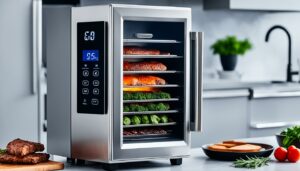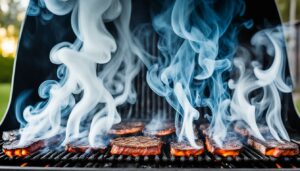I. Introduction
Barbecuing is a favorite pastime for many people, but it can be challenging for beginners. In this blog post, we will share tips and tricks to help you become a better barbequer. We’ll talk about everything you need to know to have a successful barbecue, from how to keep your meat from sticking to the grill to how to properly prepare your meat before cooking. With our advice, you’ll be able to create mouth-watering barbecue dishes and impress your guests at your next outdoor event. So, let’s get started!
Barbecuing is a skill that takes practice, and beginners can often run into problems when trying to master the art of cooking meat on the grill. In this blog post, we will share some tips to help you become a better barbecuer, learn from your mistakes, and avoid common pitfalls. Whether you’re using a gas or charcoal grill, these tips will help you achieve a perfectly grilled meal every time. From preventing meat from sticking to the grill to properly preparing meat before cooking, we’ll cover it all. So, let’s get started!
Learning from mistakes is crucial to improving your barbecuing skills. With every attempt, you will discover new techniques, methods, and grilling hacks that can be applied in future barbecuing endeavors. Barbecuing, like any other skill, requires practice and patience to master, and making mistakes is part of the learning process. By learning from your mistakes and the mistakes of others, you can quickly improve your barbecuing skills, and create a delicious meal to impress your friends and family. In this article, we’ll be sharing some tips for better barbequing to help you perfect your grilling skills.
II. Preparing for Barbequing
Preparing your cooking area is essential to successful barbecuing. Use non-stick cooking spray to prevent food from sticking. Never place food on the grill until the temperature is right, as fluctuations in temperature can cause food to dry out or burn. Before you put meat on a charcoal grill, make sure that the coals are gray. Cooking with lighter fluid can change the taste of your food, and never poke your meat while it’s cooking, as it can cause juices to leak out. Thaw your meat in advance, and avoid putting cooked meat back on the same plate that held the raw meat.
Using nonstick cooking spray is an essential step when it comes to barbecuing. It helps to prevent the meat from sticking and tearing, which can lead to the loss of valuable juices and result in dry meat. A cooking spray that doesn’t stick keeps food from sticking and makes it much easier to clean your grill. When spraying, make sure to do it evenly and at a safe distance to avoid flare-ups. This simple step will make all the difference in the final outcome of your grilled meat.
It’s important to wait until the grill reaches the correct temperature before placing food on it. Fluctuations in temperature can cause food to dry out or burn. If you’re using a charcoal grill, wait until the coals are completely gray before adding meat. This allows the temperature to level out and most of the lighter fluid to burn off. While using lighter fluid can be helpful, it can also cause food to have a different taste. You might want to think of other ways to get the charcoal going, like using a chimney starter.
When using a charcoal grill, it’s important to wait until the coals are completely gray before putting the meat on it. This will allow the temperatures to level out, and the majority of the lighter fluid to burn off. Cooking with charcoal lighter fluid can be good or bad, but it’s important to note that the lighter fluid will cause the food you’re cooking to taste different than food cooked on other types of grills. Also, trying not to use lighter fluid can be frustrating because it can be hard to light charcoal without it. To avoid an unpleasant taste, make sure the coals are gray and the lighter fluid has burned off before cooking.
III. Properly Preparing the Meat
When preparing meat for the grill, it’s essential to properly thaw it beforehand. If you try to cook partially or fully frozen meat, it might not cook evenly and could be bad for your health. Before cooking the meat, it is best to put it in the refrigerator for 12 to 24 hours. Also, for even cooking, it’s best to let the meat come to room temperature before grilling it. Handling the cooked meat with the same utensils used for the raw meat can spread unwanted illnesses, and poking holes in the meat while grilling can cause the juices to leak, making the food dry and unappealing.
Thawing meat properly before cooking is important to ensure even cooking and proper food safety. Meat should be thawed in the refrigerator for 12–24 hours before cooking, or thawed in the microwave if needed. Avoid attempting to cook meat that is still frozen or partially frozen. If the meat is thawed but still refrigerated, set it out at room temperature for some time before cooking. This will ensure the meat is at an even temperature and will cook properly.
Allowing meat to reach room temperature before cooking is essential to ensuring that it cooks evenly. This also helps to avoid overcooking the outside while the inside is still raw. By allowing your meat to sit out and reach room temperature, you’ll be able to achieve perfectly cooked and flavorful meat.
Poking holes in meat while cooking on the grill can cause the juices inside to leak out and create dry and unappealing food. It’s important to resist the temptation to constantly check the meat and avoid poking it with a fork or knife. Instead, use tongs or a spatula to flip and move the meat. This will help keep the juices inside and maintain the flavor and tenderness of the meat.
IV. Cooking and Serving Meat
When cooking meat, it’s important to avoid opening the grill’s lid too frequently to prevent a change in temperature. Additionally, never put cooked meat back on the same plate you used for the raw meat to prevent the spread of unwanted illnesses. Also, avoid handling cooked meat with the same utensils used for raw meat. If using a barbecue sauce, be sure to wait as long as possible before applying it to the meat, as applying it too early could dry out or burn the meat. Finally, avoid using tin foil or aluminum foil, as it could give your food more of a fried taste than a grilled taste.
When cooking on a grill, avoid the temptation to constantly check the meat by lifting the lid. Every time you do so, the temperature of the grill changes, which affects the cooking process. This constant change in temperature, combined with the airflow, can quickly dry out your meat. Additionally, avoid poking holes in your meat while it is cooking, as it will cause the juice inside to leak out into the bottom of the grill. Not only does this make your food dry and unappetizing, but it also potentially ruins your grill.
Overheating the grill can cause the meat to dry up and burn. While it’s okay to cook food quickly, turning up the heat too high will do more harm than good. It’s important to remember that higher heat doesn’t always mean better cooking. It’s important to maintain a balanced heat that can cook your meat thoroughly while still preserving its natural juiciness. If the grill is too hot, it may cause the meat to dry up quickly and result in a less flavorful meal.
When using barbeque sauce, it’s important to wait as long as possible before applying it to the meat. Applying it too early can potentially dry out the meat and even cause it to burn.
Wait until the meat is almost done before applying the sauce, as this will ensure that the flavor is properly absorbed and the meat remains juicy. Additionally, avoid using too much sauce, as this can also lead to dryness and overpowering the natural flavor of the meat. A light and even coating of sauce is all that’s necessary for a delicious barbequed meal.
V. Conclusion
In conclusion, barbecuing is an art that requires patience and practice. The key to a successful barbeque is to properly prepare the meat, keep an eye on the temperature, and avoid making common mistakes. Remember to allow the coals to turn gray and never poke holes in the meat to retain its natural juices. Opening the grill lid too often or overheating the grill should also be avoided.
Lastly, apply the barbeque sauce at the right time to prevent drying or burning. With these tips in mind, you can become a barbeque master and impress your friends and family with delicious, perfectly grilled meats.




